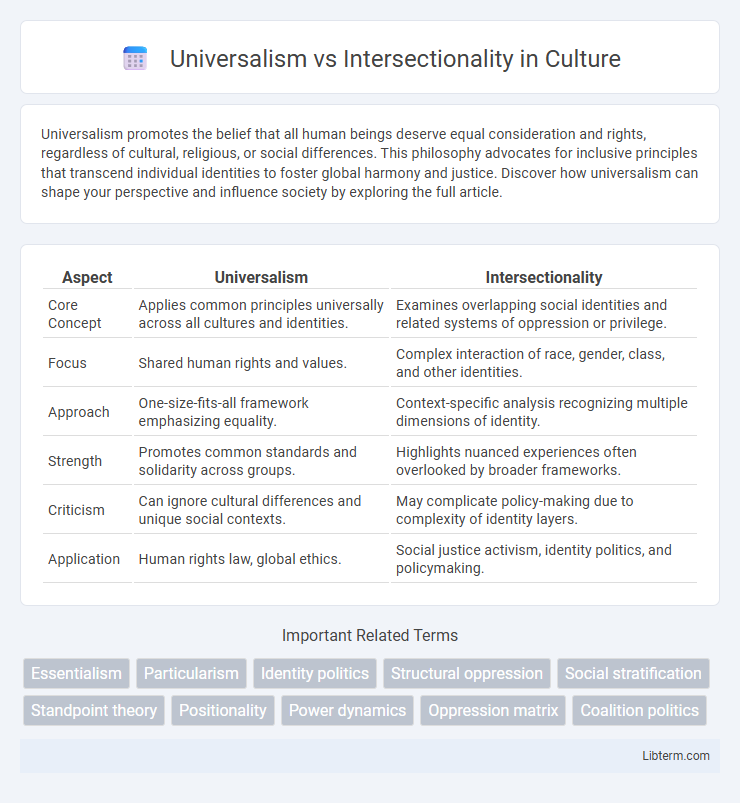Universalism promotes the belief that all human beings deserve equal consideration and rights, regardless of cultural, religious, or social differences. This philosophy advocates for inclusive principles that transcend individual identities to foster global harmony and justice. Discover how universalism can shape your perspective and influence society by exploring the full article.
Table of Comparison
| Aspect | Universalism | Intersectionality |
|---|---|---|
| Core Concept | Applies common principles universally across all cultures and identities. | Examines overlapping social identities and related systems of oppression or privilege. |
| Focus | Shared human rights and values. | Complex interaction of race, gender, class, and other identities. |
| Approach | One-size-fits-all framework emphasizing equality. | Context-specific analysis recognizing multiple dimensions of identity. |
| Strength | Promotes common standards and solidarity across groups. | Highlights nuanced experiences often overlooked by broader frameworks. |
| Criticism | Can ignore cultural differences and unique social contexts. | May complicate policy-making due to complexity of identity layers. |
| Application | Human rights law, global ethics. | Social justice activism, identity politics, and policymaking. |
Understanding Universalism: Core Principles
Universalism emphasizes the application of universal principles and values that are considered applicable to all individuals regardless of their differences in race, gender, or culture. It seeks to establish common ground through shared human rights and ethical standards, promoting equality by treating everyone under the same criteria. This approach aims to create a cohesive social framework by prioritizing general human experiences over particular identities or group-specific issues.
Defining Intersectionality: Key Concepts
Intersectionality is a critical framework that examines how multiple social identities such as race, gender, class, and sexuality intersect to create unique experiences of oppression and privilege. Coined by Kimberle Crenshaw, intersectionality highlights the compounded effects of systemic inequalities that cannot be understood through isolated categories alone. This approach challenges universalism by emphasizing that social justice efforts must address these overlapping identities to effectively combat discrimination and promote equity.
Historical Roots of Universalism
Universalism traces its historical roots to Enlightenment philosophy, emphasizing inherent human rights and equality irrespective of individual differences. This framework prioritizes universal principles that apply to all people, often grounded in rationalism and moral philosophy from thinkers like Kant and Rousseau. Universalism opposed particularistic identities, promoting a singular human experience as the foundation for legal and social systems.
The Emergence of Intersectional Theory
The emergence of intersectional theory in the late 20th century challenged the limitations of universalism by emphasizing the interconnectedness of social identities such as race, gender, class, and sexuality in shaping experiences of oppression and privilege. Intersectionality, coined by Kimberle Crenshaw in 1989, highlights how single-axis frameworks fail to capture the complexities of marginalized individuals' lives. This analytical approach has transformed social justice discourse by promoting nuanced policies and activism that address overlapping systemic inequalities.
Major Points of Tension: Universal Rights vs. Lived Experience
Universalism emphasizes universal rights that apply equally to all individuals regardless of identity, promoting a singular framework of justice and equality. Intersectionality challenges this approach by highlighting how lived experiences of race, gender, class, and other identities shape distinct forms of oppression that universal rights often overlook. The major tension lies in balancing broad, inclusive legal principles with the nuanced realities of marginalized groups whose unique struggles require specific recognition and tailored solutions.
Representation and Inclusivity: Whose Voices Matter?
Universalism emphasizes equal representation for all individuals by advocating for universal human rights and shared experiences, aiming to create inclusive platforms that transcend identity categories. Intersectionality highlights the importance of representing diverse, overlapping identities such as race, gender, and class, arguing that inclusivity requires acknowledging and addressing specific systemic inequalities faced by marginalized groups. Whose voices matter becomes a question of balancing broad universal principles with the nuanced realities of intersecting identities to ensure both representation and inclusivity are genuinely achieved.
Real-World Applications: Policy, Activism, and Advocacy
Universalism emphasizes equal rights and policies that apply universally across populations, promoting uniform legal standards and anti-discrimination laws to ensure equitable treatment. Intersectionality centers on recognizing overlapping social identities and systemic inequalities, guiding targeted advocacy and policy development that address multiple forms of oppression experienced by marginalized groups. In real-world activism, intersectionality informs inclusive strategies that prioritize marginalized voices, while universalism drives broad-based legal reforms aimed at achieving social justice for all.
Critiques and Limitations of Universalism
Universalism faces critiques for oversimplifying diverse social identities and experiences, often ignoring systemic inequalities affecting marginalized groups. Its limitation lies in promoting a one-size-fits-all approach that can erase the complexities of race, gender, class, and sexuality intersections. This results in inadequate frameworks that fail to address specific forms of oppression encountered by intersectional identities.
Challenges and Controversies in Intersectional Approaches
Intersectional approaches face challenges in balancing the recognition of unique social identities with the risk of fragmenting political solidarity. Critics argue that intersectionality's complexity can lead to difficulties in creating unified advocacy strategies, potentially marginalizing broader systemic issues. Tensions arise between universalist frameworks emphasizing common human rights and intersectional theories prioritizing multifaceted, overlapping systems of oppression.
Toward Reconciliation: Bridging Universalism and Intersectionality
Toward reconciliation between Universalism and Intersectionality requires recognizing the foundational principles of universal human rights while addressing the nuanced experiences of marginalized groups through intersectional analysis. Emphasizing the importance of inclusive policies, this approach integrates universal ideals with the complex realities of race, gender, class, and other identity dimensions to create equitable social frameworks. Bridging these perspectives fosters cooperation in social justice initiatives by validating both collective humanity and individual diversity.
Universalism Infographic

 libterm.com
libterm.com